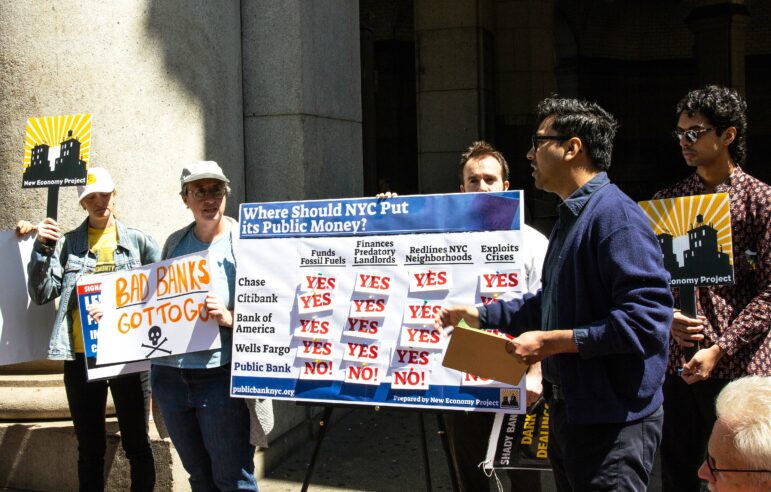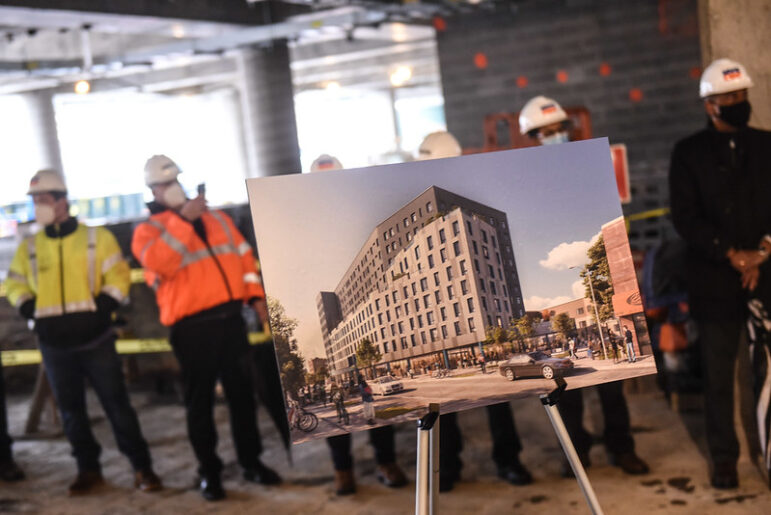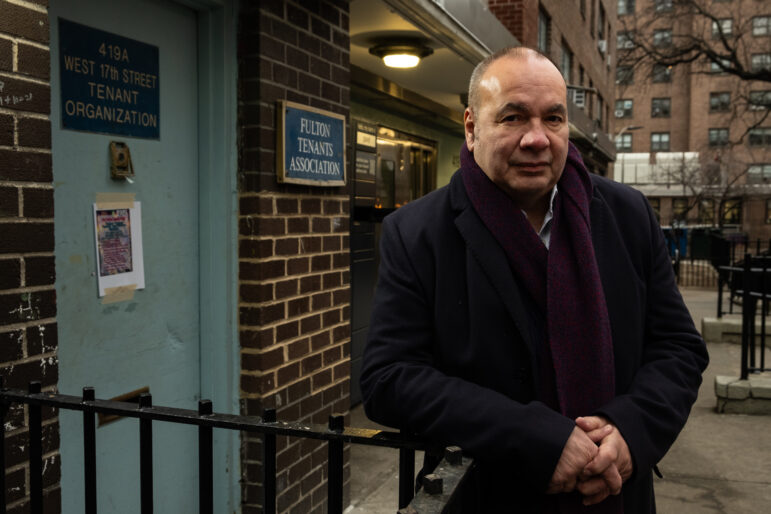
Photo by: Jarrett Murphy
The Bronx Criminal Courthouse. State law mandates that people be arraigned within 24 hours of their arrest, but the system is not always able to meet that standard.
Research by CJA indicates that the prosecutor’s bail request is the “most important factor”—more important than criminal history or charge severity or anything else—influencing the judge’s decision of whether to set bail, and the “only important factor” shaping the amount of bail set. But recent analysis by CJA of prosecutor bail requests found no consistent link between the amount of bail requested by prosecutors and the likelihood that a defendant would return for trial.
A tough task faces prosecutors in arraignment court. As case after case is called, the ADA has to scan each defendant’s rap sheet, skim the police report and digest the CJA recommendation. Sometimes there are open warrants to look at and out-of-state criminal records to contemplate, all while the ADA—often young and inexperienced, because it’s where newcomers to the DA’s office land—is gathering up the motions and notices she has to serve and deciding on whether to offer a plea deal and whether to request bail.
“Our people have about a minute to try to digest all of those things,” and must do so 50 to 60 times a day, says Staten Island District Attorney Daniel Donovan. That’s not hyperbole; the volume really can be that high. Adding to the difficulty is the fact that “so much of that information that we’re required to base our information on is actually provided by the defendant,” Donovan says. “We know the rap sheet, the evidence; we’re gonna know if we found the gun in your house, if there were eyewitnesses. But we’re going to know only from you regarding your family ties, your employment, your financial means, whether you have a phone or not. All that comes from the defendant,” he says. “The most difficult things you are going to do as a prosecutor is select jurors and come up with an articulate reason for making a request for bail,” Donovan adds. “This is not a science. This is an art. This is a feel. If some young assistant were to say, ‘We have a weak case, let’s set high bail,’ an experienced judge is going to just laugh.”
Donovan’s assistants must get bail requests approved in advance by a supervisor. In Manhattan, “we don’t have formal guidelines on what people ask for bail,” says James Kindler, the chief assistant district attorney, although he adds that, “normally we wouldn’t ask for bail on a minor offense unless someone has a significant criminal record.” In the Bronx, bail gets covered in the three week training course that assistant district attorneys complete before they enter the courtroom. “Obviously, even with guidelines it takes some experience to get it right,” Bronx District Attorney Robert Johnson says, “but essentially, you’re starting off with the statute and then you’re assessing the strength of the case. I think some of the most significant factors are if the person has a past war rant history, if a person doesn’t have ties to the community.”
Indeed, in more than 250 arraignments that City Limits Investigates witnessed over eight days and one night of court action spread around the five boroughs, prosecutors often referred to defendants’ “extensive contacts with the criminal justice system” and any “bench warrant history.” With hundreds of thousands of such war rants outstanding, there’s a lot of that history out there. But prosecutors also frequently cited merely “the nature of the case” in asking for financial conditions on a person’s liberty.
Court observers can only see what a prosecutor says, not what she’s thinking. Former prosecutors give some insight to how ADAs approach the bail request.
“I personally formulated it by number,” says former Bronx Assistant District Attorney Jason Steinberger, now in private practice in the city. “There are certain levels that were set by the office and within those levels, the district attorneys have a certain amount of discretion. I first looked at the defendant’s record. Obviously if they’re a predicate felon, then they’re facing significant jail time if convicted. I looked to see if they’re on parole or probation,” because, if so, they could face a stiffer sentence and have more incentive to flee.
Prosecutors are under considerable pressure to get bail right, says another former Bronx ADA, Jonathan Sennett, now a defense lawyer upstate. “If you made a mistake, you were account able for it—if it was a mistake,” he recalls. “We lived with the cloud over our heads constantly that you had to be on your toes because things could certainly come back to bite you in the ass. That was always in the front of our mind, that we couldn’t be sloppy with the safety of the community, or the rights of the defendants. That’s always out there.”
Their boss is out there too. Bronx DA Johnson said in August that he’d recently visited the arraignment parts and, after observing the action, had to remind his assistants that bail should be a rarity when arraigning Desk Appearance Tickets. Along with the “In God We Trust” inscription, the assemblage of court officers and the door to the lock up, the scene in arraignment court rooms usually includes a battery of two or three public defenders. Most work for the Legal Aid Society of New York, which covers courts citywide, or for one of the smaller indigent defense organizations like The Bronx Defenders, Brooklyn Defender Services and Neighborhood Defender Service of Harlem. Some low-income defendants are represented by 18-B lawyers, who are in private practice but are paid by the state to accept some indigent defendants’ cases.
Public defenders are obviously pre disposed to take a critical view of what prosecutors do. But they are not starry eyed about their clients, either. (At least you couldn’t say that about the Manhattan Legal Aid lawyer who, watching a defendant exit the courtroom, muttered audibly: “Fucking moron.”) From their vantage point, bail requests have grown increasingly harsh.
“The amounts requested by the DAs have certainly gone up, and that will change depending on what judge is working,” says Alan Gordon, a Legal Aid lawyer who has worked in Queens Criminal Court for 14 years. “Some of the numbers, it’s like it’s ‘Let’s see how high we can get it.’ Cases where they used to be asking $5,000, they’re suddenly asking for these high numbers that are just impossible to meet. If they’re going to ask for $50,000, with our clients, who are poor, they might as well be asking for a remand.” But a remand would be easier for a defense lawyer to challenge on appeal. When bail is set, a challenge faces a higher burden.
Some see the trend of higher bails as very recent in origin. “They used to ask for reasonable bail. Now they’re asking for $10,000 and $20,000,” says Laura Saft, a supervising attorney with Brooklyn Defender Services who has worked in the courts for 25 years and says the requests have swelled noticeably in the past year or so. “Every bail request is astronomical. There are no normal bail requests anymore.” (The Brooklyn and Queens district attorney’s offices declined to comment for this story.)
Defense lawyers aren’t the only ones who complain about bail decisions. Back in Queens arraignment court the same day Eric T. made his false plea, Margulis set $50,000 on Johanny for a laptop robbery that, according to the papers initially filed by the Queens DA, took place after he’d been arrested for marijuana on the night in question. Then it was $50,000 on a guy accused of brandishing a knife to avoid paying cab fare, followed by $25,000 on an assault case. Yet the ADA on duty complained to a colleague, “He’s setting less than half of what I ask for!”
If prosecutors face a tough task in deciding on an appropriate bail to request, defense lawyers are faced with an equally challenging time trying to construct a counter argument. “You have these public defenders with tons of cases, very little time to interview their clients,” says Robert Garcia, an attorney at Neighborhood Defender Service. “It’s very difficult to establish trust with their client. You have very little opportunity to learn the information, to corroborate it. You have to make a few phone calls. You don’t have time for that.”
Some clients don’t offer much ammunition for a defense lawyer’s argument, no matter how well researched. About a Manhattan defendant with a lifelong criminal record to go with his gray hair, a defense lawyer could only say, “In this last decade it’s mostly turnstile jumps. His last arrest was in 2005. He is a man who has matured.” Another lawyer boasted that his client “hasn’t had a drug arrest for four months.” And one Staten Island defendant asked Judge Alan Meyer to be merciful by saying, “I smell. I’m not doing well.”








